Study blockchain to Tsinghua, or go to Peking University? ——College entrance examination blockchain volunteering report guide
From mid-summer to summer, the results of the college entrance examination will be announced one after another, and the volunteering work of students and colleges will be carried out.
Mutual chain pulse observation, many students are actually interested in the blockchain field, and the blockchain field also needs relevant talent resources. At this time, the inter-chain pulse statistics counted college teachers who publicly expressed the research blockchain, involving 20 well-known universities such as Tsinghua University, Peking University, People's Congress, and Fudan University. A total of 55 students engaged in blockchain field research and teaching practice. A list of professors, associate professors, lecturers, and their blockchain research and practice are available for reference.
Of course, this list can also be regarded as a directory of blockchain academic big coffee to help readers grasp the academic dynamics in the blockchain field.
School blockchain: Go to Tsinghua, or go to Peking University?
Looking back on the exams in the past, in the eager and worried eyes of the parents, the distance from the school to the school has become the primary consideration of the college entrance examination students.
- YOOSourcing Xu Jianhai: Chatting about the new block of "blockchain + global trade" | Chain node AMA
- Blockchain Security | How do hackers steal your encrypted assets from their mobile phones?
- Bitcoin in India: the premium is over $600, the more banned the more "crazy"
The 20 universities affiliated with 55 students of the inter-chain pulse statistics are located in 8 provinces and cities. The north is basically concentrated in Beijing, the south is relatively scattered, and there are more cities to choose from.
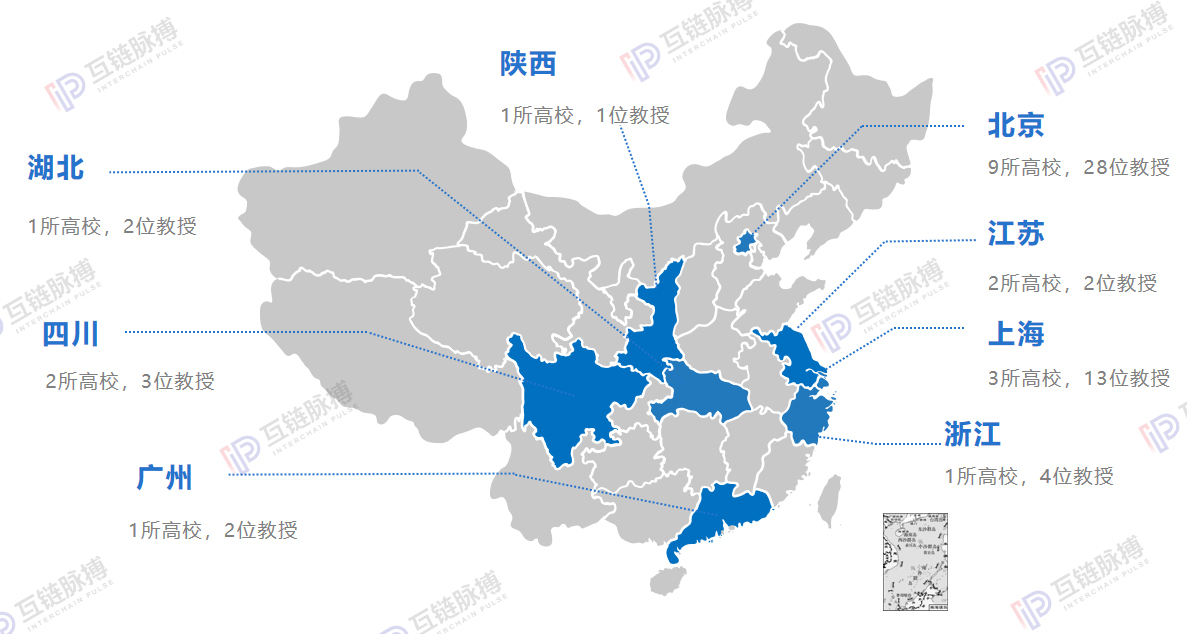
Among them, 28 professors from 9 universities belonged to Beijing, accounting for 51%; 13 professors from 3 universities belonged to Shanghai, accounting for 24%; while the remaining 14 professors belonged to Zhejiang, Sichuan and Guangdong. 8 colleges and universities in the province. Judging from the statistics of the inter-chain pulse, the number of blockchain professors in Beijing and Shanghai is significantly higher than that in other regions, far exceeding the two places in the “blockchain four cities”.
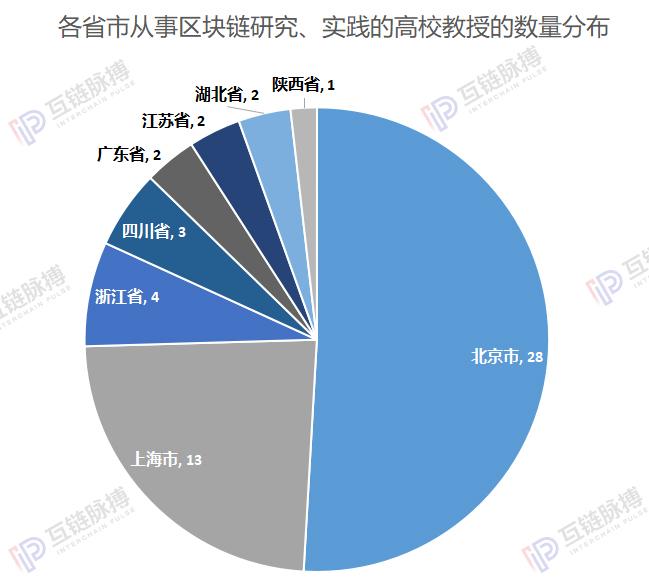
When the city is finalized, “going to Tsinghua University or going to Peking University” will not only be a childhood reverie, but a key issue to be considered next.
If the exploration of the blockchain is premised, it is necessary to pay attention to the blockchain teaching of professors and lecturers in various universities.
Among the 55 professors in 20 universities with mutual chain pulse statistics, there are 20 professors and lecturers from 10 universities, and they are engaged in the teaching of blockchain-related courses. First, there are five schools in Tsinghua, Peking University, Zhongcai, People's Congress, and China's political and legal schools in Beijing.
List of university blockchain teaching professors in the North (Beijing area)
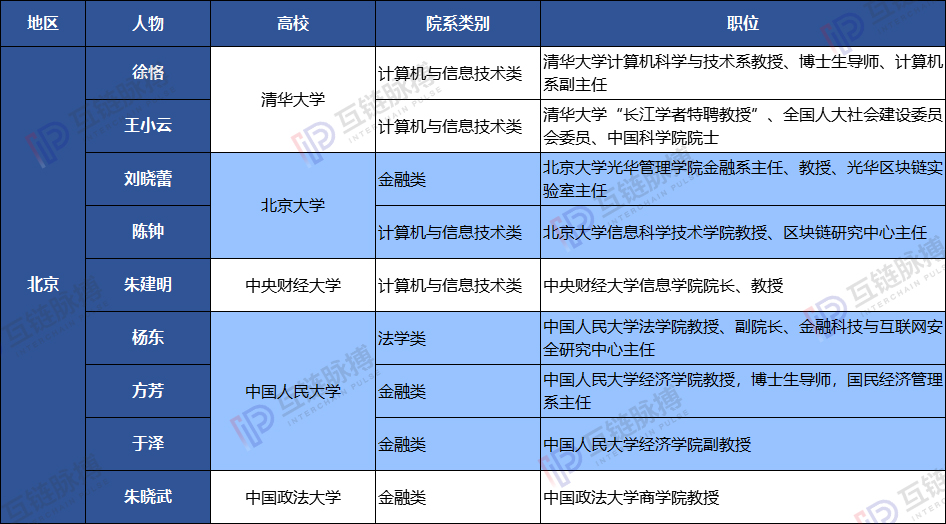
In September 2017, Tsinghua University launched the postgraduate course “Cibo Intelligent Economy and Blockchain”, which systematically teaches the concept of cyber intelligent economy, supports the intelligent economic operating system, and plays a role in the new operating system. Xu Wei, a professor at the Department of Computer Science and Technology at Tsinghua University, and Wang Xiaoyun, a Distinguished Professor of the Yangtze River Scholar, participated in the course.
The Guanghua School of Management at Peking University launched the first paid course in the blockchain field in November 2018, “Frontier Applications and Value Creation”. The lecturers included Professor Liu Xiaolei and Professor Chen Zhong. In addition to the lectures, Professor Liu Xiaolei also participated in the recording of the blockchain special program in the CCTV "Dialogue" column; and taught at the blockchain knowledge seminar held by the Loudi CPPCC. Professor Chen Zhong also put forward suggestions and ideas on the popularization of blockchain technology and theory in the blockchain education of colleges and universities.
In 2016, the Central University of Finance and Economics established the Joint Laboratory of the Century Internet Blockchain of the Central University of Finance and Economics, and opened the “Blockchain Technology” course in the country. The first blockchain textbook was published in January 2018. Blockchain Technology and Application, the textbook was compiled by Professor Zhu Jianming from the School of Information. In addition, Professor Zhu Jianming also wrote a blockchain book "Blockchain Development Series"; and at the China Computer Society Youth Computer Technology Forum, he proposed the "blockchain technology and e-commerce platform product information traceability and anti-counterfeiting model" report.
In November 2018, Renmin University of China opened the "Blockchain Advanced Training Course – Authoritative Double Certification Blockchain Training Course", which is mainly for off-campus business people. The School of Economics Fang Fang and Professor Yu Ze are in the course of the course. teacher. It is reported that Professor Yang Dong of Renmin University of China Law School is the earliest blockchain application research scholar in China, and established China's first big data blockchain and supervision technology laboratory, and opened the first domestic one in Renmin University. Undergraduate courses related to blockchain. It has also published books on blockchains such as “Golden Law: Blockchain Business Practice and Legal Guide” and “Blockchain+Regulatory=Regchain” (RegChain).
China University of Political Science and Law opened its innovative practice course “Blockchain and Digital Economy” in September 2018, and Zhu Xiaowu, a professor at the School of Business, served as the lecturer.
List of university blockchain teaching professors in the South (Shanghai, Zhejiang, etc.)
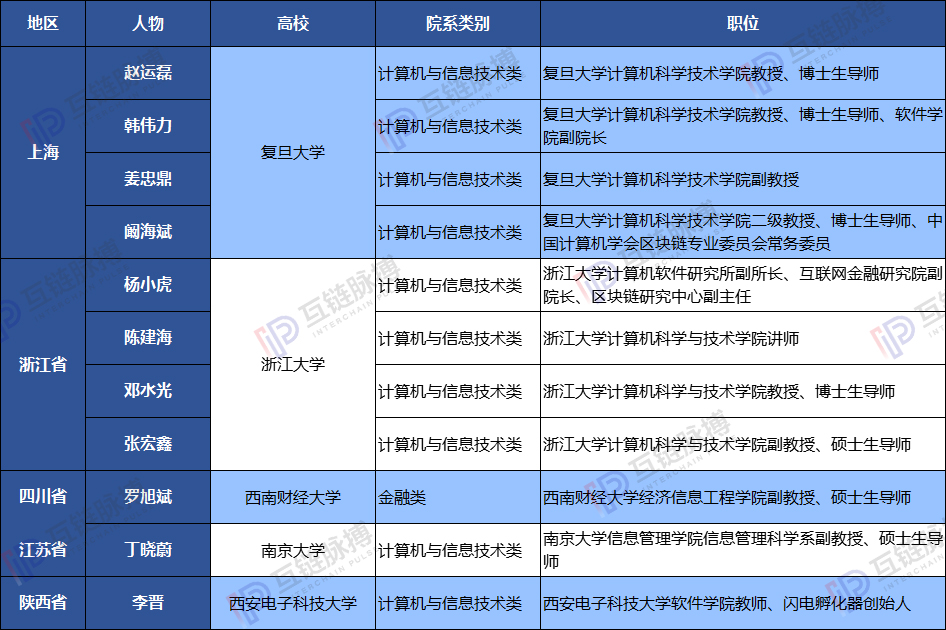
Five provinces and cities such as Shanghai and Zhejiang Province have Fudan University, Zhejiang University, Southwestern Finance, Nanjing University, and Xi'an University of Electronic Science and Technology. A total of five schools are promoting the development of blockchain-related courses.
In July and December 2018, Fudan University launched the “Blockchain Technology System and Development Capability Seminar” and the “Blockchain Technology Management System (Blockchain+) Seminar”, similar to the seminar of Renmin University of China. It is mainly for people who are interested in blockchain outside the school. It is reported that after completing the course, the course will also receive the academic certificate issued by Fudan University. Zhao Yunlei, Han Weili, Jiang Zhongding, and Qi Haibin are professors at four computer science and technology colleges.
In May 2018, Zhejiang University also opened the "2018 Zhejiang University blockchain training class – the authoritative course of blockchain entrepreneurs", Chen Jianhai, Deng Shuiguang, Zhang Hongxin three professors and teachers of the School of Computer Science and Technology as a lecturer . Later, in November 2018, the School of Computer Science and Software College of Zhejiang University launched the “Blockchain and Digital Currency” course, and Yang Xiaohu served as the lead teacher.
Luo Xubin, an associate professor at the School of Economics and Information Engineering at Southwestern University of Finance and Economics in Sichuan Province, taught the postgraduate course "Blockchain Technology and Encrypted Digital Currency" and the undergraduate course "Blockchain Technology and Encrypted Digital Currency".
Ding Xiaowei, Associate Professor, Department of Information Management Science, School of Information Management, Nanjing University, has taught the course “Blockchain+Artificial Intelligence and Financial Innovation”. The main content of this lesson is blockchain programming and artificial intelligence programming, emphasizing practical application.
Li Jin, a teacher at the School of Software, Xi'an University of Electronic Science and Technology, Shaanxi Province, taught the blockchain generalization course “Blockchain and Innovation and Entrepreneurship” and “Practical Principles and Development of Blockchain” in 2018; The University teaches the Principles and Applications of Blockchain. As early as 2013, the lightning incubator was founded, focusing on smart hardware, mobile internet, blockchain and other fields; at the end of 2017, it jointly established the “Node Blockchain Accelerator” with Paper Gui Technology.
Mutual chain pulse observation The blockchain courses in which the above-mentioned universities and professors participate: part of the continuing education-style paid courses for non-school students, and the other part are graduate students and senior undergraduates for the university. Professional courses offered.
At present, these blockchain courses in various institutions are still in the exploratory stage. The content of the courses is mostly based on the basic principles of the blockchain and the introduction. The teaching forms of the professors of each school have not yet formed a professional system. However, with the development of the current curriculum, more and more colleges have further promoted the development and development of blockchain-related courses.
Engage in blockchain: Can you major in finance or law?
According to the blockchain teaching situation of the university and its own situation, after determining the school, the next step is to make a professional choice. Perhaps in the public impression, can you only choose computer or information technology related majors when learning the blockchain? In fact, financial and legal majors are closely integrated with the blockchain field.
Mutual chain pulse observation of the distribution of 55 professors, of which 54% belong to the faculty of computer and information technology; 24% belong to the faculty of economics such as economics and management, business and so on; 11% belong to the law school system. In addition, the inter-chain pulse will also list the cyber security category of the computer and information technology categories as a single category, which accounts for 7% of the total.
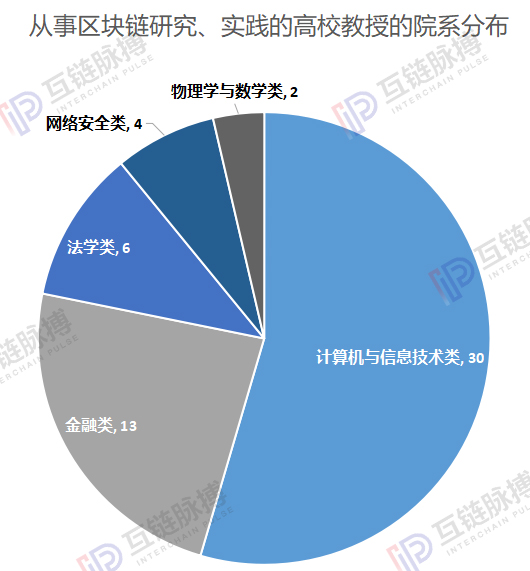
Among them, there are financial departments, Zhu Yan, Professor of the Department of Management Science and Engineering, School of Economics and Management, Tsinghua University, and Dean of the Internet Industry Research Institute of Tsinghua University. He has repeatedly expressed his views on the blockchain and the digital economy at the on-campus seminars and blockchain conferences. In January of this year, at the first annual conference on China's blockchain industry economic development held by Tsinghua University, Zhu Yan also gave a speech entitled "Industry Innovation under the Digital Economy Paradigm".
Chen Bo, deputy researcher of the Institute of Finance and Economics of the Central University of Finance and Economics, and the head of the blockchain consensus economics research group (has settled in the chain pulse writer, click to view its column) , is also the teacher of the financial department to explore the blockchain. representative. In 2019, the "Blockchain Consensus Economics White Paper: Discovering Entropy Assets" report was issued, and blockchain research continued.
Wang Fahui, a professor of law at Nanjing University of Posts and Telecommunications and dean of the Institute of Information Industry Development Strategy, has published the article "Compliance and Risk: Two Eternal Themes of Blockchain Development" and pointed out that no matter how it is applied The development of blockchain must be under the premise of ensuring security. The development and security of blockchain must be promoted simultaneously. The application of a new technology, "safe and controllable" is a key element, which is to achieve high quality development. The meaning of the title.
Among the departments of computer and information technology, there are professors affiliated to the Department of Cyber Security, Professor Chen Gongliang from the School of Cyberspace Security, Shanghai Jiaotong University. He has presided over and participated in the national key research and development program "New Principles and New Algorithms of Electronic Money"; and he has made a keynote speech on "The Essential Connotation of Blockchain – Undeniable Events" in the blockchain competition.
The two cybersecurity college professors at Wuhan University also belong to this category. Professor of National Cyber Security College of Wuhan University, Hubei Province “Hundred Talents Program”, Professor of Louisville University, and Cui Xiaohui, Head of Food Safety Blockchain Alliance, has long been engaged in big data cloud computing, blockchain, high performance computing research, and In July 2017, he gave a report titled "Blockchain Technology and Its Application" at Huazhong Agricultural University.
Professor He Dejun, a professor at the National Cyber Security Institute of Wuhan University and a member of the Cryptography and Blockchain Technology Laboratory, is mainly engaged in the application of cryptography, cloud computing security, blockchain security, etc., and has written a paper based on blockchain. IoT Key Agreement Protocol, Design and Implementation of Anti-Counterfeiting System Based on Blockchain Technology.
Going a step further: Where is the blockchain research going?
Mutual chain pulse statistics, nearly half of the university professors engaged in blockchain and related fields, devoted to blockchain teaching, in addition, more professors focus on the study of blockchain technology, and several of them are professors. Research has achieved some results.

In the "18th Fair", State Grid Information and Communication Industry Group Co., Ltd. released the enterprise-level blockchain service platform – "Spirit Chain". This project is based on the "blockchain-based IoT data security and trustworthy sharing" technical achievements completed by the team of the Network Technology Research Institute of Beijing University of Posts and Telecommunications, as a self-controllable core technology. At present, the platform has been successfully applied in various scenarios such as financial auditing, supply chain logistics, and multilateral trading.
Ma Zhaofeng, an associate professor at the School of Cyberspace Security at Beijing University of Posts and Telecommunications, in August 2017, led and established a joint lab for blockchain and security technology, completed the underlying platform of the public chain, and the results were formally applied; in June 2018, the block was completed. The chain smart contract security evaluation, the evaluation indicators have reached the security requirements, the system went online smoothly; in July 2018, the joint lab of blockchain technology and application innovation was established to complete the trusted blockchain and application platform and scientific research results.
Duan Jiang, a professor of the Department of Computer Science and Technology at Southwestern University of Finance and Economics, conducted research and transformation of results in the blockchain and related fields in 2016. Later, the University of Southwestern University of Finance and Economics has jointly issued the first blockchain application project of the National Youth League in 2018, namely the “Chengqing·Public Welfare” volunteer service system, which will register the volunteer service information. To ensure that volunteer information and points earned cannot be tampered with.
Zhang Shengli, professor of the School of Electronics and Information Engineering of Shenzhen University and executive deputy director of the Blockchain Technology Research Center of Shenzhen University, proposed, designed and developed a private identity mapping public chain from December 2017 to July 2018; 2017 11 During the period from April to April 2018, the excellent course online alliance chain system was designed and developed.
The above-mentioned professors who have achieved certain research results rely on the blockchain laboratory of colleges and universities. Inter-chain pulse statistics, not only the above, but also seven professors in the university blockchain laboratory, and explore the relevant content.
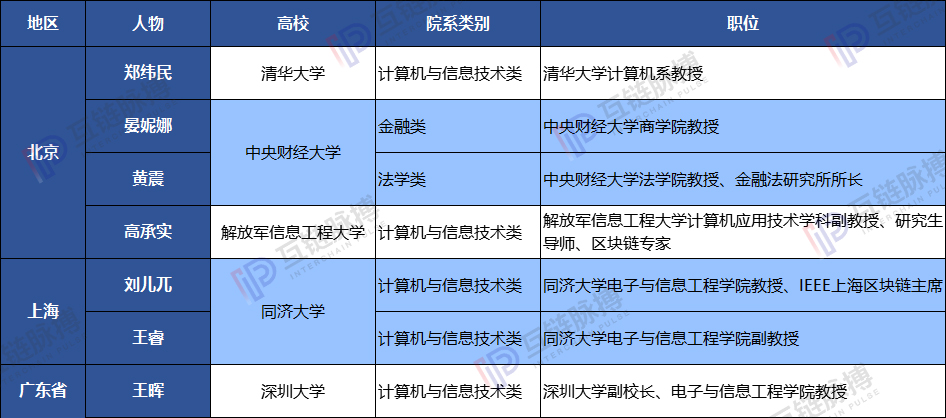
In July 2018, the Joint Research Center for Blockchain Technology jointly established by the Department of Computer Science of Tsinghua University and Beijing Aershan Financial Technology Co., Ltd. was established. Zheng Weimin, a professor of computer science at Tsinghua University, is a member of the Academic Committee of the Research Center.
In April 2019, the “Financial Purchasing Innovation Lab” was unveiled at the Central University of Finance and Economics. Professor Jin Nina from the School of Business of Central University of Finance and Economics, on behalf of the laboratory, released three major research topics in 2019, including VAT-specific electronic invoices and financial management changes in the context of blockchain.
In December 2018, Huang Zhen, a professor at the Central University of Finance and Economics Law School, was hired as a special expert of the Expert Committee of the “People's Venture Capital Blockchain Research Institute” and published on the “2018 People's Network Blockchain Technology Winter Forum” on the blockchain supervision. Speech.
Gao Chengshi, an associate professor of computer application technology at the Information Engineering University of the People's Liberation Army, served as the first executive dean of the Blockchain Research Institute of the Information Support Force Information Engineering University of the People's Liberation Army. It was previously reported that the institute has obtained technical software works for the blockchain industry. 21 intellectual property rights.
Professor Liu Erqi and Associate Professor Wang Rui from the School of Electronics and Information Engineering of Tongji University, the main research interests and application areas include the blockchain, and both of them serve as researchers in the intelligent laboratory of artificial intelligence and blockchain of Tongji University.
Wang Hui, vice president of Shenzhen University and professor of the School of Electronics and Information Engineering, is the director of the Shenzhen University Blockchain Technology Research Center. It is reported that the research center relies on the “National Engineering Laboratory of Big Data System Computing Technology of Shenzhen University”. The main research directions are: research on blockchain basic theory; blockchain system development; blockchain application in different industries; Chain talent training training platform construction.
Mutual chain pulse observation University professors on the blockchain research, relying on the blockchain laboratory and research center of each college, and actively cooperate with enterprises and social forces to jointly promote research and exploration. At present, some have obtained certain application results, or have applied for related patents. The above teachers and institutions may become the targets of students who want to conduct blockchain research in the future.
I also hope that the above summary will help the college entrance examination students to choose the school and department that suits them, and receive the ideal admission letter as soon as possible.
55 professors from 20 universities and their blockchain practice activities chart:

Author: Mutual chain pulse King-propelled vehicle
This article is [inter-chain pulse] original, the original link: https://www.blockob.com/posts/info/16677 , please indicate the source!
We will continue to update Blocking; if you have any questions or suggestions, please contact us!
Was this article helpful?
93 out of 132 found this helpful
Related articles
- More “coin days” than the chain trading volume indicator, more able to reflect the flow of funds
- Interpretation of Libra: A revolution covering 2.7 billion people? Still a whimsical girl
- Awards for Call for Papers | Celebrating the first anniversary of the PlatON Cloud Map release!
- Twitter Featured: Connect V God, say your worship of the Ethereum application Top 3
- Technical Guide | Libra Technical Interpretation! Explain the move syntax, interpreter, and introducer
- “Everyone is looking for 茬”—BUG collection activities are in progress
- Jingwei Ventures: We have compiled 12 questions about Facebook and his Libra






